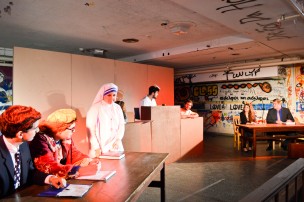“Lucy Goes to Court” is the second original play going up in the WestCo Café, a week after “Godspell.”
While Second Stage has long been known as a strong supporter of student-written works, this season in particular is offering an especially diverse mix of original pieces. Of the eight shows being produced this semester (including one performance art piece), three are new adaptations and two are entirely original plays.
“Lucy Goes to Court” is the second of those plays, going up a week after “Godspell” in the same space, the WestCo Café. The two make for interesting companion pieces: “Godspell” is quite supportive of the more endearing parts of Christianity while “Lucy” is fairly cynical of the state of modern religion.
“Lucy” is a farce that portrays what happens when several religions suddenly come together and take Satan to trial for all her (yes, her) crimes against humanity over the last few millennia. It is a courtroom drama of the supernatural, but this does not unfold as one would expect. For one thing, writer/director Hazem Fahmy ’17 offers an interesting take on the Devil, and not just because he gender-bends.
“I think about the Devil a lot,” Fahmy said.
Lucifer (Lucy for short), as played by Xandra Ellin ’18, is more of a child; she’s a self-proclaimed “bitch,” not exactly evil, and just wants to get drunk with her friends. Ellin has quite a bit of fun with the role, rolling her eyes at the prosecution and seducing the judge in equal measure.
Her shield and sword is the character Saul Goodman, taken straight from the television world of “Breaking Bad” and the upcoming “Better Call Saul,” here portrayed by Jake Lahut ’17 in place of Bob Odenkirk. The prosecution consists of Mother Teresa (Hannah Skopicki ’18), King Henry VIII (Oren Maximov ’17), and Mitt Romney (Daniel Giovanniello ’17), each representing a different religion and acting nothing like their real-life counterparts. Mother Teresa livens up the room, prancing around in her long robes, screaming obscenities the real life version would never dare say in public (or, probably, at all). Romney and Henry VIII are at their best when they grovel at Mother Teresa’s feet, which is not a sentence that gets written often.
As the trial progresses, chaos reigns. The intent of some characters is not as clear as it first seems, and Lucy becomes increasingly fed up with what she sees as false accusations while the court discusses the philosophy of war, America, sex, and other things. Most importantly, the court at large discusses religion. Gandhi (played by Fahmy) muses on the merits of Heaven, while Lucy is adamant she is not the source of the world’s ills.
Fahmy makes the interesting decision to add several original songs to the production, but without live accompaniment. Actors instead sing to recordings or, more often then not, entirely a cappella. It is an impressive feat for the performers to achieve.
The production, quite like its narrative, is somewhat miraculous. Fahmy and stage manager Nola Werlinich ’17 said they struggled with repeated setbacks, including having to switch actors halfway through the rehearsal process. Werlinich, like many stage managers, is the unsung hero of the production: she recruited new cast and crew members mere days before opening night. Before the penultimate rehearsal, she gathered the ensemble in a warm-up while paint dried on the remaining pieces of the set that were intended to transform the Café into a distinguished heavenly courtroom, and Maia Nelles-Sager ’17 hung the final lights.
“It’s been very appropriate,” Fahmy said. “For me, this is my first time directing and my first time writing.”
Fahmy and Werlinich are among quite a few novice combos producing shows this season. “Worm Queen,” “Godspell,” “Lucy,” and the upcoming “Theban Plays” all boast first-time directors and stage managers for the Wesleyan stage. The “Lucy” cast is relatively new as well, with nine out of its 11 cast members never having acted in a Wesleyan production before.
“Neither of us had any idea what we were doing,” Werlinich said.
When Fahmy asked Werlinich to stage manage his show, she accepted on a whim, later admitting she thought it was a joke. They also didn’t submit their Second Stage application materials until the night they were due, Werlinich recalled.
“Well, looking back, it’s indicative,” she said, laughing.
Fahmy said that working with other inexperienced cast members helped calm his anxieties about putting on a show.
“It helped with me not being intimidated,” Fahmy said. “We were very newbie when this process started.”
For Werlinich, that atmosphere contributed to a more collaborative project.
“We had a big cast and so many other people have joined the team since then, and I was just excited to be working with so many people,” Werlinich said.
There does certainly seem to be a sense of camaraderie amongst the large cast, and that isn’t entirely surprising. The vast majority of them alternate between sitting together in the courtroom and hiding behind the set for the entirety of the production. That is the exact type of situation that fosters cast bonding.
“There are so many inside jokes in the cast,” said Max Cembalest ’18, who plays the angel Gabriel. “They are vulgar, they are disgusting, and none of them make sense.”
Lucifer and “Lucy” have been through heaven and hell over the last two months, and now both arrive in WestCo this weekend. Seats are first-come, first-serve to Heaven’s courtroom.
